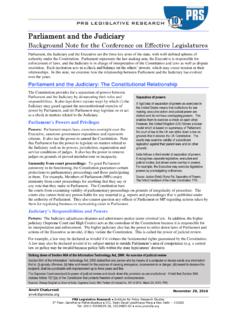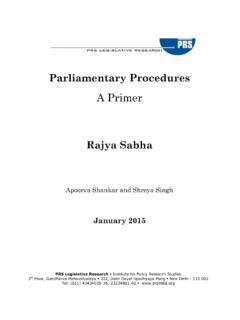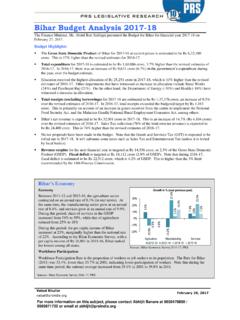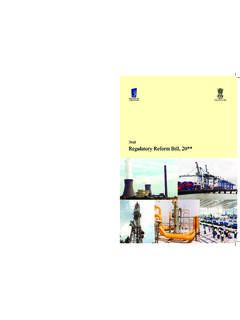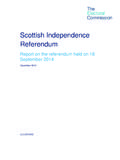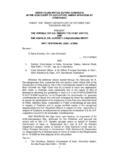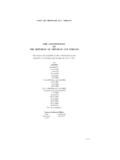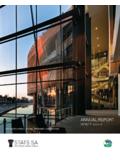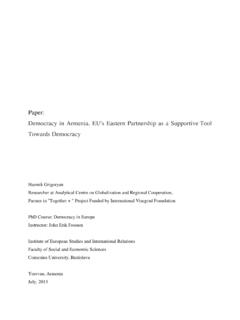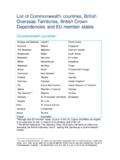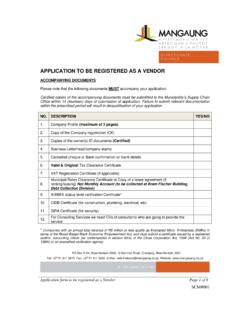Transcription of Standing Committee Report Summary - PRS
1 Prianka Rao January 4, 2016 PRS Legislative Research Institute for Policy Research Studies 3rd Floor, Gandharva Mahavidyalaya 212, Deen Dayal Upadhyaya Marg New Delhi 110002 Tel: (011) 43434035-36 Standing Committee Report Summary Feasibility of holding simultaneous elections to Lok Sabha and State Legislative Assemblies The Standing Committee on Personnel, Public Grievances, Law and Justice (Chairperson: Dr. Sudarsana Natchiappan) submitted its Report on the Feasibility of Holding Simultaneous Elections to House of People (Lok Sabha) and State Legislative Assemblies on December 17, 2015. Need for holding simultaneous elections: The Committee noted that the holding of simultaneous elections to Lok Sabha and state assemblies would reduce: (i) the massive expenditure that is currently incurred for the conduct of separate elections; (ii) the policy paralysis that results from the imposition of the Model Code of Conduct during election time; and (iii) impact on delivery of essential services and (iv) burden on crucial manpower that is deployed during election time.
2 Term of Lok Sabhas: The Committee noted that of the 16 Lok Sabhas that have been constituted so far, seven were dissolved pre-maturely due to coalition governments. However, it observed that lately, the legislatures have been completing their full term. Anti defection law and President s power to proclaim emergency: The Committee observed that the introduction of the Anti Defection Act, 1985 has prevented political defection in the ruling party. This has had a direct bearing on the term of the legislature. The Committee also noted that in 1994, the Supreme Court interpreted Article 356 of the Constitution, in relation to the exercise of the President s power to proclaim a state of emergency in a state. The Supreme Court had held that the President can put the legislative assembly of a state in suspended animation (where functioning is temporarily stopped) but cannot dissolve it without concurrence of Parliament.
3 Further, the validity of the proclamation of the President s rule may be examined by the judiciary. The Committee stated that this has strengthened the federal structure of the country by striking a constitutional balance between the central and state governments. Recommendations of the Law Commission: The Committee referred to the recommendations of the Law Commission of India, which had suggested that elections of legislative assemblies whose term ends six months after the general elections to Lok Sabha can be clubbed together. However, the results of such elections can be declared at the end of the assembly s tenure. Conditions for holding early elections: The Committee noted that the Representation of People Act, 1951 permits the election Commission to notify general elections six months prior to the end of the terms of Lok Sabha and state assemblies.
4 The Committee recommended that in order to hold early elections to Lok Sabha and state legislative assemblies, one of two conditions must be met: (i) a motion for an early general election must be agreed to by at least two-thirds of all members of the House; or (ii) a no confidence motion must be passed by the House, and with no alternative government being confirmed within 14 days of passing a confidence motion. Holding of elections in two phases: The Committee recommended that elections could be held in two phases. It stated that elections to some Legislative Assemblies could be held during the midterm of Lok Sabha. Elections to the remaining legislative assemblies could be held with the end of Lok Sabha s term. Schedule of next cycle of elections: The Committee suggested that the proposed first phase of assembly elections could be held in November, 2016.
5 Elections to all state assemblies whose terms end within six months to one year before or after the appointed election date can be clubbed together. Similarly, the second phase of elections can be held in 2019 with the General Elections to Lok Sabha. Schedule of Bye-elections: The Committee also recommended that bye-elections to all seats that become vacant during a year may be conducted together during a pre-determined time period. DISCLAIMER: This document is being furnished to you for your information. You may choose to reproduce or redistribute this Report for non-commercial purposes in part or in full to any other person with due acknowledgement of PRS Legislative Research ( PRS ). The opinions expressed herein are entirely those of the author(s). PRS makes every effort to use reliable and comprehensive information, but PRS does not represent that the contents of the Report are accurate or complete.
6 PRS is an independent, not-for-profit group. This document has been prepared without regard to the objectives or opinions of those who may receive it.


